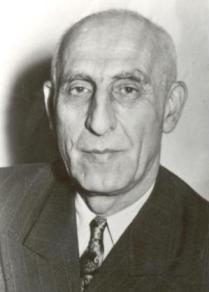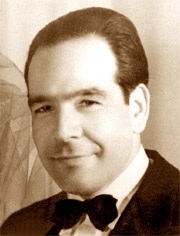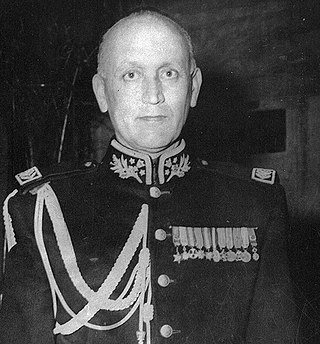Related Research Articles

Mohammad Mosaddegh was an Iranian politician, author, and lawyer who served as the 35th Prime Minister of Iran from 1951 to 1953, after appointment by the 16th Majlis. He was a member of the Iranian parliament from 1923, and served through a contentious 1952 election into the 17th Iranian Majlis, until his government was overthrown in the 1953 Iranian coup d'état aided by the intelligence agencies of the United Kingdom (MI6) and the United States (CIA), led by Kermit Roosevelt Jr. His National Front was suppressed from the 1954 election.

Sayyed Abol-Ghasem Mostafavi-Kashani was an Iranian politician and Shia Marja.

The 1953 Iranian coup d'état, known in Iran as the 28 Mordad coup d'état, was the U.S.- and UK-instigated, Iranian army-led overthrow of the democratically elected Prime Minister Mohammad Mosaddegh in favor of strengthening the monarchical rule of the shah, Mohammad Reza Pahlavi, on 19 August 1953. It was aided by the United States and the United Kingdom. The clergy also played a considerable role.
The Tudeh Party of Iran is an Iranian communist party. Formed in 1941, with Soleiman Mirza Eskandari as its head, it had considerable influence in its early years and played an important role during Mohammad Mosaddegh's campaign to nationalize the Anglo-Persian Oil Company and his term as prime minister. The crackdown that followed the 1953 coup against Mosaddegh is said to have "destroyed" the party, although a remnant persisted. The party still exists but has remained much weaker as a result of its banning in Iran and mass arrests by the Islamic Republic in 1982, as well as the executions of political prisoners in 1988.

The Abadan Crisis occurred from 1951 to 1954, after Iran nationalised the Iranian assets of the BP controlled Anglo-Iranian Oil Company (AIOC) and expelled Western companies from oil refineries in the city of Abadan.

The National Front of Iran is an opposition political organization in Iran, founded by Mohammad Mosaddegh in 1949. It is the oldest and arguably the largest pro-democracy group operating inside Iran despite having never been able to recover the prominence it had in the early 1950s.

All the Shah's Men: An American Coup and the Roots of Middle East Terror is a book written by American journalist Stephen Kinzer. The book discusses the 1953 Iranian coup d'état backed by the U.S. Central Intelligence Agency (CIA) in which Mohammed Mossadegh, Iran's democratically elected prime minister, was overthrown by Islamists supported by American and British agents and royalists loyal to Shah Mohammad Reza Pahlavi.

The National Socialist Workers Party of Iran, better known by its abbreviation SUMKA, was a Neo-Nazi party in Iran. The symbol of the party was a very simplified Faravahar, on their flag it appeared in a similar arrangement to the NSDAP flag.

Ali Razmara, also known as Haj Ali Razmara, was a military leader and prime minister of Iran.

Hossein Fatemi was an Iranian scholar. A close associate of Prime Minister Mohammad Mosaddegh, he proposed nationalization of Iranian oil and gas assets. Initially a journalist, he served as minister of foreign affairs from 1951 to 1953. After the 1953 coup d'état toppled the government of Mosaddegh, Fatemi was arrested, tortured, and convicted by a military court of "treason against the Shah", and executed by a firing squad.

Assadollah Rashidian was an Iranian businessman and anglophile who, along with his brothers, played a critical role in the 1953 overthrow of Iranian Prime Minister Mohammed Mossadegh. He was a principal covert agent of the British Secret Intelligence Service (SIS) and through him the U.S. Central Intelligence Agency (CIA) was able to convince the Shah, Mohammed Reza Pahlavi, to endorse the operation.

Fadā'iyān-e Islam is a Shia fundamentalist group in Iran with a strong activist political and terrorist orientation. The group was founded in 1946, and registered as a political party in 1989. It was founded by a theology student nicknamed Navvab Safavi. Safavi sought to purify Islam in Iran by ridding it of 'corrupting individuals' by means of carefully planned assassinations of certain leading intellectual and political figures.
The Abadan Crisis was a major event in Iranian history. It began in 1951 with the nationalization of the Anglo-Iranian Oil Company by the government of Iran, and the shutting down by the British of the Anglo-Iranian Oil Company's huge oil refinery in Abadan. It ended with a successful CIA-orchestrated coup which overthrew the democratically elected government of Mohammed Mosaddeq in 1953, and enabled the Shah to rule autocratically for the next 26 years, before he was overthrown by the Iranian Revolution.

Sayyid Hassan Emami was an Iranian Shia cleric and royalist politician. He worked as a judge in the Ministry of Justice and taught law at the University of Tehran.

Mohammad-Ali Angaji was an Iranian Shia cleric and politician. A loyal National Front member, he served as a member of parliament during the 17th term and ran for the 1954 election in Tehran. He was elected to the 73-seats Assembly of Experts for Constitution in 1979.
Mohammad-Hassan Shamshiri, more known as Haj Hasan Shamshiri, was an Iranian bazaari restaurateur, philanthropist and civic patriotic activist.

Abdol Hossein Hejazi (1904–1969) was an Iranian military officer who served as the commander of the Imperial Iranian Army's Ground Forces between 1958 and 1960.

Nader Batmanghelidj (1904–1998) was an Iranian military officer who served in various military and government posts. He also served as the ambassador of Imperial Iran to Pakistan and Iraq.
Ahmad Ali Sepehr, also known as Movarrekh Al Dowleh, (1889–1976) was an Iranian historian and politician. He held several government posts during both the Qajar and Pahlavi rule.
Atash was a Persian language right-wing newspaper which was published from 1946 to 1947 in Tehran, Iran.
References
- 1 2 3 4 5 6 7 Mark J. Gasiorowski [ permanent dead link ]
- ↑ Statement of Mark Gasiorowski to the National Commission on Terrorist Attacks Upon the United States. globalsecurity.org, July 9, 2003
- ↑ "Political Science". Archived from the original on 2010-01-26. Retrieved 2009-10-01.
- ↑ Kinzer, Stephen All the Shah's Men : An American Coup and the Roots of Middle East Terror, Stephen Kinzer, (John Wiley and Sons, 2003), Page xxvii
- ↑ Kinzer, All the Shah's Men, 2003, p.212
- ↑ Government and Politics of the Middle East and North Africa, googlebooks
- ↑ Mohammad Mosaddeq and the 1953 Coup in Iran. Reviewed by L. Carl Brown. Foreign Affairs, November/December 2004
- ↑ “The Real Power in Tehran,” The Guardian, June 29, 2005]